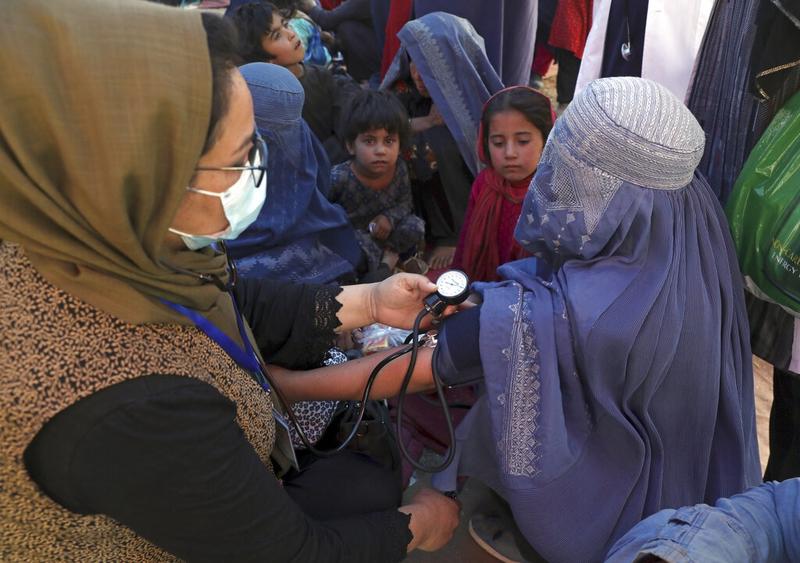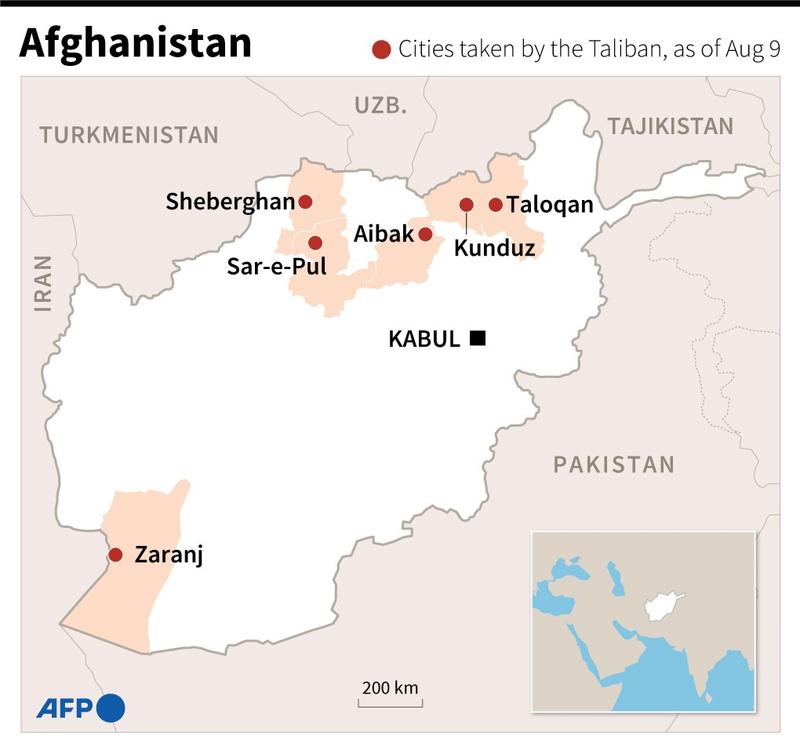 An internally displaced woman from northern provinces, who fled her home due to fighting between the Taliban and Afghan security personnel, has her blood pressure taken after taking refuge in a public park in Kabul, Afghanistan, Aug 10, 2021. (RAHMAT GUL/AP)
An internally displaced woman from northern provinces, who fled her home due to fighting between the Taliban and Afghan security personnel, has her blood pressure taken after taking refuge in a public park in Kabul, Afghanistan, Aug 10, 2021. (RAHMAT GUL/AP)
KABUL - Taliban fighters tightened their control of captured territory in northern Afghanistan on Tuesday as residents hid in their homes and a pro-government commander vowed to fight to the death to defend Mazar-i-Sharif, the biggest city in the north.
The Taliban, battling to defeat the US-backed government and reimpose strict Islamic law, swept into Aibak meeting little resistance
President Ashraf Ghani called on regional strongmen to support his embattled government after a stunning string of Taliban gains and as the United States said it was up to Ghani's forces to defend themselves.
In the town of Aibak, capital of Samangan province on the main road between Mazar-i-Sharif and the national capital, Kabul, Taliban fighters were consolidating their grip, moving into government buildings, residents said.
Most members of the government security forces appeared to have withdrawn, residents said, as they kept off the streets.
ALSO READ: Taliban overrun Afghan cities of Kunduz, Sar-e Pul, Taloqan
"The only way is self-imposed house arrest or to find a way to leave for Kabul," said Sher Mohamed Abbas, a provincial tax office, when asked about living conditions in the town.
"But then even Kabul is not a safe option anymore," said Abbas, a father of four children and a sole bread winner for a family of nine.
Abbas said Taliban had arrived at his office and told workers to go home. He and other residents said they had not seen nor heard fighting on Tuesday.
The Taliban, battling to defeat the U.S-backed government and reimpose strict Islamic law, swept into Aibak on Monday meeting little resistance.
 This AFP graphic shows a map of Afghanistan locating Zaranj, Sheberghan, Kunduz, Sar-e-Pul, Taloqan and Aibak, cities that have fallen to the Taliban.
This AFP graphic shows a map of Afghanistan locating Zaranj, Sheberghan, Kunduz, Sar-e-Pul, Taloqan and Aibak, cities that have fallen to the Taliban.
Taliban and government officials have confirmed that the Islamists have overrun six provincial capitals in recent days in the north, west and south.
Security forces in Pul-e Khumri, capital of Baghlan province, to the southeast of Aibak, were surrounded as Taliban closed in on the town, at a main junction on the road from the north to Kabul, a security official said.
Gulam Bahauddin Jailani, head of the national disaster authority, told Reuters fighting was going on in 25 of the 34 provinces and 60,000 families had been displaced over the past two months, with most seeking refuge in Kabul.
'Dying in dignity'
The Taliban, ousted in the weeks after the Sept 11, 2001, attacks on the United States, are in a position to advance from different directions on Mazar-i-Sharif. Its fall would deal a devastating blow to Ghani's government in Kabul.
Atta Mohammad Noor, a northern militia commander, vowed to fight to the end, saying there would be "resistance until the last drop of my blood".
"I prefer dying in dignity than dying in despair," he said on Twitter.
 Taliban fighters stand guard in Kunduz city, northern Afghanistan, Aug 9, 2021.
ABDULLAH SAHIL/AP)
Taliban fighters stand guard in Kunduz city, northern Afghanistan, Aug 9, 2021.
ABDULLAH SAHIL/AP)
India was sending a flight to the city to take its citizens home, its embassy said, asking Indians to leave. The United States and Britain have already advised their citizens to leave Afghanistan.
In Kabul, Ghani's aides said he was seeking help from regional militias he has squabbled with over the years to rally to the defence of his government. He also appealed to civilians to defend the country's "democratic fabric", aides said.
The United States will complete the withdrawal of its forces at the end of this month under a deal with the Taliban, which included the withdrawal of foreign forces in exchange for Taliban promises to prevent Afghanistan being used for international terrorism.
The Taliban promised not to attack foreign forces as they withdraw but did not agree to a ceasefire with government forces. They have made surprising gains in the north, which was for years the most peaceful part of the country with only minimal Taliban presence.
Their strategy appears to be to take the north, as well as main border crossings in the north, west and south, then close in on Kabul from the north as well as from their southern and eastern heartlands.
READ MORE: Taliban take provincial capital, kill Afghan govt spokesman
The government has withdrawn forces from hard-to-defend rural districts to focus on holding major population centres.
Under the troop withdrawal deal struck with the Trump administration, the Taliban were meant to seek peace with the Ghani's government but months of intermittent talks have been fruitless.
Government officials have appealed for pressure on neighbouring Pakistan to stop Taliban reinforcements and supplies flowing over the porous border. Pakistan denies backing the Taliban.
The United States has been launching air strikes in support of government troops but said it was up to Afghan forces to defend their country.
"It's their struggle," John Kirby, a Pentagon spokesperson, told reporters on Monday.


